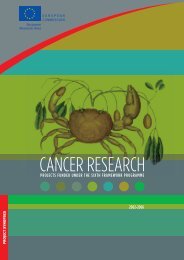I527-290 ESRIF Final Report (WEB).indd - European Commission
I527-290 ESRIF Final Report (WEB).indd - European Commission
I527-290 ESRIF Final Report (WEB).indd - European Commission
You also want an ePaper? Increase the reach of your titles
YUMPU automatically turns print PDFs into web optimized ePapers that Google loves.
foresight can enhance fl exibility in policy-making and implementation, broaden perspectives, and encourage thinking outside<br />
the box (‘thinking the unthinkable’), which are also important elements for tackling future security issues.<br />
There are several reasons why foresight has acquired this high level of prominence. A number of important<br />
technological, economic, societal, political and environmental trends and developments affect all countries as well<br />
as most policy domains. In order to deal with the challenges associated to these developments, a new culture of<br />
future-oriented thinking is needed. This applies also to policy-making processes, which can be assisted by foresight<br />
in various ways.<br />
The increasing number and variety of foresight programmes suggests that foresight can be a useful policy tool in rather<br />
diff erent types of contexts, ranging from national and regional innovation systems to sectoral and corporate policies. The<br />
major factors driving the diff usion of foresight can be summarised in telegraphic style as follows (Havas et al., forthcoming):<br />
Given the signifi cance of globalisation, sweeping technological and organisational changes, as well as the ever-increasing<br />
importance of learning capabilities and application of knowledge, our future cannot be predicted by any sophisticated<br />
model in a suffi ciently reliable way. History also teaches us valuable lessons about the (im)possibilities of planning and<br />
predicting the future, not least in the context of security. Therefore, fl exibility, diversity, open minds for, and awareness of<br />
possible futures are thus indispensable.<br />
In the knowledge economy, more attention is required to develop a number of skills, such as creativity, innovative problemsolving,<br />
communication and co-operation profi ciency in multidisciplinary, multicultural teams. New forms of co-operation<br />
(e.g. clusters, innovation networks) have become a key factor in creating, diff using and exploiting knowledge and new<br />
technologies, and therefore in satisfying social needs and achieving economic success. Developing these kinds of skills<br />
requires exploring future skills and capability needs.<br />
As for policy-making itself, there is a widening gap between the speed, complexity and uncertainty of technological and<br />
socio-economic changes giving rise to security issues, on the one hand, and of the ability to devise appropriate policies,<br />
on the other. Under these circumstances, longer-term considerations and the precautionary principle are bound to gain a<br />
growing attention in guiding policy-making processes.<br />
Governments try hard to balance their budgets, while cutting taxes. Hence, they need to reduce public spending relative<br />
to GDP. In the meantime, accountability – why to spend taxpayers’ money, on what – has become even more important<br />
in democratic societies. Public R&D and innovation expenditures are as much subject to these demands as investments<br />
in security assets (even if both areas have received a lot of attention and preferential treatment when it comes to fi nancial<br />
allocations during the decade or so).<br />
Policy-makers also have to deal with intensifying social concerns about new technologies. This is the case, for instance, for<br />
ethical and safety concerns related to biotech or nuclear technologies, and fears of unemployment and social exclusion<br />
caused by the rapid diff usion of other new technologies. But it is also refl ected in the broad notion of (societal) security that<br />
has become prominent in policy debates.<br />
The credibility of science is somewhat fading, and with it the ‘objectiveness’ of policies based on scientifi c research. Scientists<br />
themselves are known to have diff erent opinions and come to diff erent conclusions on the same issue. This also applies<br />
to security research, where expert circles alone do not dispose of the necessary legitimacy to defi ne what is ’true’. Instead,<br />
participation of a wider audience is increasingly needed.<br />
Foresight helps policy-makers to sense and anticipate these kinds of developments. It allows realising and reacting to trends,<br />
and thus points to action needed to block or slow down negative trends and accommodate favourable developments.<br />
Moreover, recent foresight actions aim explicitly at picking up weak signals: weak but very important hints that a fundamental<br />
re-assessment and re-alignment of current policies are needed. In other words, foresight can serve as a crucial part of an early<br />
warning system, and it can be used as an instrument for an adaptive, ‘learning society’.<br />
121

















